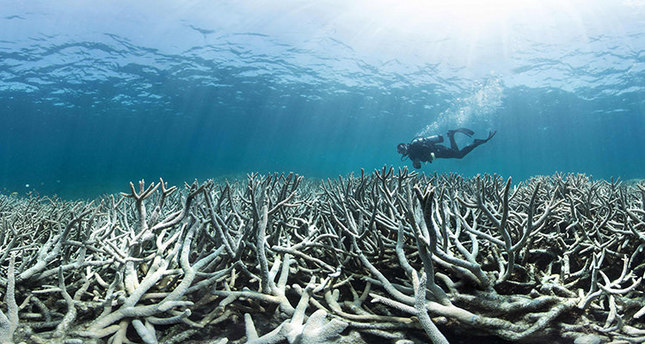By Hannah Stafford, News Editor
A well-known author and environmentalist, Rowan Jacobsen, published an article in Outside Magazine entitled “Obituary: Great Barrier Reef (25 Million BC-2016)” on Oct. 11.
The supposed obituary went viral.
Its opening lines, “The Great Barrier Reef of Australia passed away in 2016 after a long illness. It was 25 million years old,” garnered international attention as millions of people expressed anger, fear and disbelief through social media.
Jacobsen cited coral bleachings as the cause of death and went on to say, “No one knows if a serious effort could have saved the reef, but it is clear that no such effort was made. On the contrary, attempts to call attention to the reef’s plight were thwarted by the government of Australia itself.”
Multiple scientists, however, also read the obituary and collectively disagree with Jacobsen’s statement. While the reef may be dying, it certainly is not dead.
Russell Brainard, chief of the Coral Reef Ecosystem Program at NOAA’s Pacific Islands Fisheries Science Center, was one of the first to refute Jacobsen’s claim. He told Huffington Post that though the recent bleaching is a “severe blow,” we are still “very far from an obituary.”
Bleaching is a condition where the warmth of the water causes coral to release large amounts of algae, which, if not remedied, can lead to starvation. However, it is not uncommon for various forms of life to temporarily suffer from food shortage. While the situation is serious, it is not hopeless.
[perfectpullquote align=”right” cite=”” link=”” color=”” class=”” size=””]Multiple scientists, however, also read the obituary and collectively disagree with Jacobsen’s statement. While the reef may be dying, it certainly is not dead.[/perfectpullquote]
“These natural systems do have some ability to be resilient and bounce back,” said Brainard to the Huffington Post.
Kim Cobb, a professor in Georgia Tech’s School of Earth and Atmospheric Sciences, told a very similar opinion to the LA Times.
“For those of us in the business of studying and understanding what coral resilience means, the article very much misses the mark,” she said. “It’s not too late for the Great Barrier Reef, and people who think that have a really profound misconception about what we know and don’t know about coral resilience.”
Brainard went on to say that he believes the article is meant to highlight the urgency of the reef’s condition; however, many people “are going to take it at face value that the Great Barrier Reef is dead.”
Brainard believes this hyperbolic attitude will not only convince people that there is no hope for the reef but could consequently lead to a loss of efforts to save the reef. That is why he and many other scientists are taking the initiative to better inform the public of what is wrong and what can be done to help.
In studies conducted over the last year, roughly 93 percent of the reef experienced some sort of bleaching. Terry Hughes, director of the ARC Centre of Excellence for Coral Reef Studies, believes that Jacobsen’s negative article will harm efforts to save the reef at a time when it desperately needs conservation efforts to be heightened.
He told the Huffington Post that he was “not impressed by the [article’s] message that we should give up on the [Great Barrier Reef], or that it is already dead. The message should be that it isn’t too late for Australia to lift its game and better protect the Great Barrier Reef, not we should all give up because the Great Barrier Reef is supposedly dead.”




